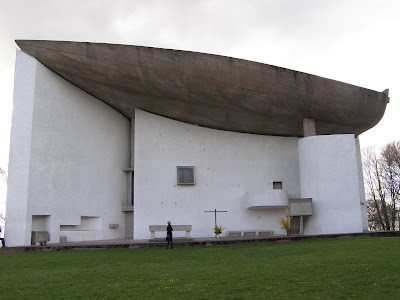















The project aims to give back to the site a more contemplative and spiritual dimension through the introduction of a solution for a community of nuns the hill.
The goal is to create a discreet atmosphere worthy of the chapel, to highlight its value. At the same time, special attention to the improvement of existing facilities for the reception of visitors.

PLANT
The project includes two main elements: the new guard house and the convent.
The current gatehouse will be replaced by a more harmonious building that better meets the needs of reception of visitors. Inserted into the hillside, will be fully integrated with the surrounding landscape. A glass facade opens to the new landscape.
 VIEW FROM THE HOOD
VIEW FROM THE HOOD Nature plays a fundamental role in the project, highlighting the sanctity and the remoteness of the site. The preservation of existing trees and reforestation of the slopes of the hill will give a sense of unity to the whole.

CONCEPTUAL MODEL
At the heart of the project, although not visible from the chapel, is the complex of buildings comprising the nunnery: Twelve households for the sisters, a chapel open to pilgrims and a shelter to accommodate nine visitors in search of rest and spiritual calm.

SECTION

two cells for two illustrious
The cells are small independent units, arranged in clusters and along the western slope of the hill. Situated on the hillside, surrounded by vegetation - color stacks transmit light in other parts of buildings. Built in concrete, the units are very simple and ascetic, but each has a winter garden, a space dedicated to contemplation.

ENVIRONMENT
The oratorio was conceived as part of the nunnery. Outside the site of the chapel, the aim is that the chapel is a space contemplation and communion open to visitors.
With its bare concrete walls are directly cut into the hillside, creating a harmonious unit with the chapel and the site.

ORATORIO
Most of the project is covered by vegetation and large glass walls that offer views of the valley. The predominant materials are concrete and zinc, which are used for small roofs of the buildings of the nuns. These materials are associated with a minimalist design to create a suitable environment for meditation.






0 comments:
Post a Comment